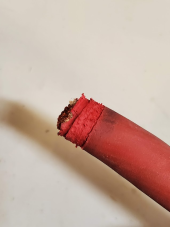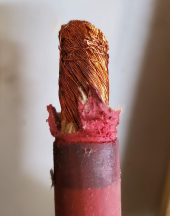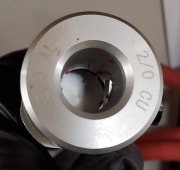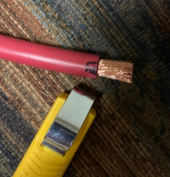Klein makes a manual version of the same style stripper.Eh, couldn't they make an attachment for a cordless drill? Another power tool just for cable stripping? This would be overkill for me.
You are using an out of date browser. It may not display this or other websites correctly.
You should upgrade or use an alternative browser.
You should upgrade or use an alternative browser.
Insulation Stripper?
- Thread starter HRTKD
- Start date
DerpsyDoodler
Solar Addict
- Joined
- Jan 10, 2021
- Messages
- 2,247
I used a jokari cable knife. worked fine for me.Klein makes a manual version of the same style stripper.
Firstascent
Solar Enthusiast
- Joined
- Mar 7, 2020
- Messages
- 265
Yeah from the photos that were posted earlier of the dewalt version it looks like that’s exactly what they did. They simply could’ve made an adapter like the dewalt and then you could use and drill.Eh, couldn't they make an attachment for a cordless drill? Another power tool just for cable stripping? This would be overkill for me.
The Milwaukee version does have its pros though being more low profile if you’re working in tight spots which is a big plus. Not for me but I’m fairly certain I’m not their intended market haha.
Any work I do in electrical panels (for work) is all 24v control wiring.
I know this is an old thread. However I just obtained the Jokari.
First I set the depth of the blade to the thickness of the insulation.
Basically I measured the length of the cut. Then I applied painters tape around the wire where the cut was wanted.
The Jokari can wander creating a spiral cut. The tape helped as a template in making a straighter cut.
I still found myself using a box cutter. On one or two occasions to break through an errant small spiral cut. It also proved helpful creating a longitudinal cut from the cut to the end of the wire so that the piece of insulation came off easier.
First I set the depth of the blade to the thickness of the insulation.
Basically I measured the length of the cut. Then I applied painters tape around the wire where the cut was wanted.
The Jokari can wander creating a spiral cut. The tape helped as a template in making a straighter cut.
I still found myself using a box cutter. On one or two occasions to break through an errant small spiral cut. It also proved helpful creating a longitudinal cut from the cut to the end of the wire so that the piece of insulation came off easier.
Woot.com has the Dewalt insulation strippers on sale.
One size fits 6 - 750. $229, on sale for $79

 www.woot.com
www.woot.com
Complete kit. $499, on sale for $408.

 www.woot.com
www.woot.com
One size fits 6 - 750. $229, on sale for $79

DEWALT DCE151B 20V MAX* XR Cable Stripper Tool Only
DEWALT DCE151B 20V MAX* XR Cable Stripper Tool Only
Complete kit. $499, on sale for $408.

DEWALT DCE151TD1 20V MAX XR Cable Stripper, Cor
DEWALT DCE151TD1 20V MAX XR Cable Stripper, Cor
Horsefly
Solar Wizard
I was looking at the $79 one on Woot, but it looks like it doesn't have any of the bushings that are in the $408 kit. Aren't the bushings required?
I was looking at the $79 one on Woot, but it looks like it doesn't have any of the bushings that are in the $408 kit. Aren't the bushings required?
The cutter is adjustable on the cheaper one.
Firstascent
Solar Enthusiast
- Joined
- Mar 7, 2020
- Messages
- 265
I wanted to add some quick first hand knowledge I’ve learned from these sets. I have the Milwaukee version, and I absolutely love it, cuts through insulation like butter!Woot.com has the Dewalt insulation strippers on sale.
One size fits 6 - 750. $229, on sale for $79

DEWALT DCE151B 20V MAX* XR Cable Stripper Tool Only
DEWALT DCE151B 20V MAX* XR Cable Stripper Tool Onlywww.woot.com
Complete kit. $499, on sale for $408.

DEWALT DCE151TD1 20V MAX XR Cable Stripper, Cor
DEWALT DCE151TD1 20V MAX XR Cable Stripper, Corwww.woot.com
BUT, I think there are a few key details one should know just so you have the right expectations especially at a premium cost $$$
the individual dies are not made for the type of wire we all typically use for our battery cables, nor are they designed with the fine stranded wire in mind that is common for a lot of us.
Typically, from my experience with Ancor wire specifically, the insulation is a little thicker. What this means is that you will mostly likely have to use the next size up on the die… if you have a 2/0 wire you will need to use the 3/0 die. This creates a little play because now the die is a little larger than your wire. Combine that with the fine strands which cut easily and it’s easy to end up with a handful of strands cut off.
if you’ve seen any videos of these of folks from the industry these were actually designed for and they just shove the wire in and pull the trigger without any thought needed with perfect results… don’t expect that with fine stranded wire. You’ll need to make sure you’re feeding your wire in nice and straight, and go a little slower.
as I mentioned, it’s a great tool and I love it. Just know they were designed for a different industry. I think if either company actually made the correct dies for our battery cables it would be so much better.
Firstascent
Solar Enthusiast
- Joined
- Mar 7, 2020
- Messages
- 265
I believe the dies/bushings are still required, which is why it’s so much cheaper since they aren't included.The cutter is adjustable on the cheaper one.
the cutter is adjustable on all the bushings but they don’t have enough adjustment to where a single die can handle that wide of a range, they don’t move as far as you’d think. Think of it as fine tuning.
TorC
Solar Enthusiast
- Joined
- Jan 13, 2022
- Messages
- 514
I do as Hedges does with a utility knife. You soon learn the feel of how deep to go, and a bit of flexing the fine stranded wires will break that last little insulation. I'd have to be doing a lot of stripping to bother with anything else, and by the time my system is all set up, I've got over twenty five 4/0 cables to make up.
On crimps, however, I got that non-ratcheting FTX copy of the fancy dieless tool for $135 after a test crimp with the hammer crimper came out garbage. Seems to be doing an excellent job.
On crimps, however, I got that non-ratcheting FTX copy of the fancy dieless tool for $135 after a test crimp with the hammer crimper came out garbage. Seems to be doing an excellent job.
I bought the Dewalt DCE151B from Woot. It comes with no cutters. You must buy them individually, starting around $35. I bought a 2/0 cutter but the 2/0 welding cable was very difficult to push into the cutter. I then bought a 3/0 cutter thinking it would fit the 2/0 cable better. While the welding cable does go into the 3/0 cutter easier, the cutter is so large that it hardly cuts the insulation.
Here's my attempt at cutting 2/0 welding cable with the 3/0 cutter, with the cutting blade adjusted in as far as it will got.

I went back to the 2/0 cutter and put some muscle into shoving the cable into the cutter. It still didn't work.
I switched to my Klein Stripper tool and used the 3/0 cutter on it. This is the best I could do. It didn't seem to cut any of the strands but it did twist them. The result isn't clean enough and would require additional work with a utility knife.

The Klein has maybe 1mm of adjustment on the blade, which isn't enough at all. The Dewalt blades can be adjusted about 3mm.

The Dewalt 2/0 cutter. The sharp part of the blade is at about the 3 o'clock position. It's adjusted in as far as it will go.

I don't recall what type of wire the Klein cutter is rated for. The Dewalt cutter is rated for THHN & XHHW. These tools just aren't designed for welding cable. At least that's my experience. I'm back to using a box cutter.
Here's my attempt at cutting 2/0 welding cable with the 3/0 cutter, with the cutting blade adjusted in as far as it will got.

I went back to the 2/0 cutter and put some muscle into shoving the cable into the cutter. It still didn't work.
I switched to my Klein Stripper tool and used the 3/0 cutter on it. This is the best I could do. It didn't seem to cut any of the strands but it did twist them. The result isn't clean enough and would require additional work with a utility knife.

The Klein has maybe 1mm of adjustment on the blade, which isn't enough at all. The Dewalt blades can be adjusted about 3mm.

The Dewalt 2/0 cutter. The sharp part of the blade is at about the 3 o'clock position. It's adjusted in as far as it will go.

I don't recall what type of wire the Klein cutter is rated for. The Dewalt cutter is rated for THHN & XHHW. These tools just aren't designed for welding cable. At least that's my experience. I'm back to using a box cutter.
I've used this style jacket slitter for years.
 www.panduit.com
www.panduit.com
I think I have 5 of them set for different cable sizes, once you dial them in it is super simple to strip any jackets up to 2".
My favorite has a rotating 90 degree knife so once you've made the cut around the wire, you can turn the blade at a right angle to slice the jacket off the end without needing a second cutter. I think Paladin makes the 90 degree model.
If it's a very flexible jacket, you can clean it up with a hook blade. The curve of the blade makes it easy to trim by following the curve of the cable without nicking the strands.
Panduit | CST114-157
Learn about Panduit® CST114-157 Cutters & Strippers and other Crimpers, Cutters, Strippers & Accessories. Contact Panduit today.
I think I have 5 of them set for different cable sizes, once you dial them in it is super simple to strip any jackets up to 2".
My favorite has a rotating 90 degree knife so once you've made the cut around the wire, you can turn the blade at a right angle to slice the jacket off the end without needing a second cutter. I think Paladin makes the 90 degree model.
If it's a very flexible jacket, you can clean it up with a hook blade. The curve of the blade makes it easy to trim by following the curve of the cable without nicking the strands.
Similar threads
- Replies
- 7
- Views
- 1K
- Sticky
- Replies
- 65
- Views
- 4K
- Replies
- 208
- Views
- 7K
- Replies
- 5
- Views
- 699



